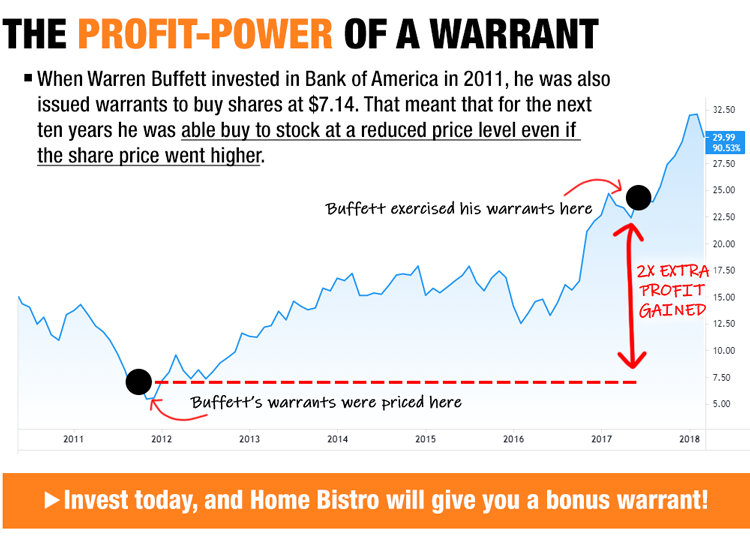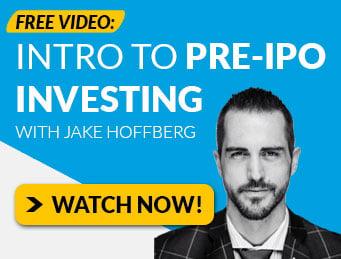Ever wish you could “turn back time” and buy more shares of your best performing investment?
Or find an opportunity that you’d love to own more of — but instead of paying full price, lock-in a “sweetheart” deal that would let you buy shares at a discount, whenever you wanted?
Well, it’s possible…
And if it sounds like some sort of sneaky “backdoor” deal only Wall Street insiders could make, you’re right, it is.
We call it the Wall Street Double Dip…
And in today’s email, I’m going to reveal the secret behind one of the most lucrative deal structures in capital markets.
I’ll also tell you how this asset class is being used to fuel one of the most explosive trends on Wall Street today. And what you need to know in order to profit from this often misunderstood investment.
When Retail Meets Wall Street
If you’ve ever bought anything at a retail store, you’re probably familiar with how promotional offers work.
Maybe they’re running a “buy one get one half off” special… a “buy one get one free”… or maybe you buy something today, and get a discount on a future order.
Why do they do this? Because they may have a product they need to move (and they’d like to get it done quickly). Or, they’re in a competitive space and are looking for a way to “sweeten the pot” for potential customers who are shopping around.
While most investors may not realize this, Wall Street – just like any other business – has the same challenges every other business does.
Except the product they sell isn’t a physical product or software product…
Instead, they sell financial products, which are basically pieces of “digital paper” that constantly need to be sold.
And just like any other industry, the value of these pieces of paper is heavily impacted by how they are marketed.
For example, special purpose acquisition companies (SPACs)… which – for most of their lifespan – were seen as a low-grade investment opportunities few companies would use to go public.
But thanks to 2020, it’s now one of the hottest investment trends on Wall Street.
Why? Well for one, it allows retail investors to get access to the normally off-limits deals…
But the other reason is that because of the “mystery box” nature of the investment – investors don’t know what company will be acquired – the SPAC sponsors need to sweeten the pot to make it more attractive.
Instead of selling only common shares, they typically include a “bonus” that gives investors extra upside potential.
This “package” of securities is called a Unit, and usually this Unit contains a mix of common shares and something called a Warrant.
You may not have heard of Warrants before, but these are what Wall Street insiders negotiate when they’re doing deals.
How Warrants Work
A Warrant is a contract between the issuer (i.e. the company) and the investor (i.e. you) that grants the option to buy more shares – at a pre-negotiated price (the “exercise price” or “strike price”) – for a specific period of time (the “expiration date”).
If that sounds a lot like an Options contract, that’s because it’s almost the same thing, but with one crucial difference.
- Options are typically sold in “lots” that give the owner the right to buy 100 shares of a specific stock
- Warrants can be customized to give the owner the right to buy any number of shares specified.
Also, unlike options, warrants are issued by the company itself. Options, on the other hand, can be freely created by individual market participants who may be trying to speculate, hedge their position or earn extra income.
According to Steve Sosnick, Interactive Brokers chief strategist:
“A warrant is different from an option because the company doesn’t receive the proceeds from an option”
For the typical individual investor, “warrants have virtually all the same characteristics and may serve most of the same objectives as call options or long-term equity anticipation securities (LEAPS),” Johnson says.
So why ever buy a stock warrant? The most important practical difference between warrants and options is that they can have longer lives.
Most options trading happens on contracts that expire in days, weeks or months. Those with the longest durations, the LEAPS, only go out about two years.
Stock warrants, however, can sometimes confer the right to buy or sell for many years down the road. On occasion, those dates can be five or 10 years down the line, giving the buyer a lot of time for the wager to play out.
And the advantage of this? Well, what we’re always looking for as an investor is “mispriced risk” that creates the opportunity for a “free lunch.”
Because it’s hard to predict where a company’s stock will be 5 years from now – especially when it’s a smaller company with unpredictable revenues – Warrants create an opportunity to “lock-in” today, the chance to “buy more” shares for cheap in the future.
For example: Company A’s stock is trading at $1 per share, and you own one Warrant that gives you the right to buy one Share for $1.50 (the “strike price”) and lasts for 60 months (the “expiration date”).
This means at any point in time over the next five years, you convert that Warrant to a share for $1.50.
Obviously, if the stock is trading below $1.50, you wouldn’t make any money on this deal (i.e. the Warrant is “out of the money”).
But, if the stock goes above $1.50, you can “exercise” your warrants, buy the stock at the cheaper price, and then sell them at the higher price for a profit (i.e. the Warrant would now be “in the money”).
This is how Warren Buffett made billions on Bank of America.
About ten years ago, he struck a deal to invest in the bank and as part of the deal, he acquired warrants for BAC common stock at an exercise price of $7.14 each.
Eventually, the stock reached $24.32 per share, and the Oracle of Omaha netted a 240% gain… turning a $5 billion investment into $17 billion.
That’s why we call this the Wall Street Double Dip…
How do you get in on these deals?
The good news is, you don’t have to gamble on a SPAC to take advantage of this unique deal structure.
We’re starting to see smaller issuers – some who trade publicly – use Regulation A+ to put together these deals as a way to attract new retail shareholders and raise capital.
Yes, you read that right.
Public companies are starting to turn to crowdfunding to help them attract investment capital!
And the reason why might shock you…
Most people think that a public company can just “issue” more shares and sell them “in the market”… but it doesn’t quite work that way.
There are extensive rules and regulations regarding how a company can sell shares and who they can sell too.
Using a Reg A+ offering alleviates many of these issues companies face AND it opens the doors to reach a greater audience of potential investors.
It also allows the company to raise capital directly from investors without having to sell their shares to a middle-man (like a bank or broker), who would then resell shares to retail investors like you after taking a cut.
As a private market investor, this means you can have your cake and eat it too: a private market investment opportunity for a publicly traded stock.
Which just so happens to be another one Wall Street’s favorite deal types, known as “private investment in public equities” (or “PIPE” for short)… a topic we’ll be revisiting in a future issue.
Yours for investing equality,
Jordan Gillissie – CEO
Equifund


